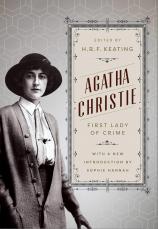Agatha Christie: First Lady of Crime
Review
Agatha Christie: First Lady of Crime
Agatha Christie is the best-selling novelist of all time, but does this make her one of the best? If you are a longtime reader of Dame Agatha or have seen some of her movies and plays but never cracked open one of her novels, this collection of essays compiled by the late H. R. F. Keating is a great place to start.
AGATHA CHRISTIE: FIRST LADY OF CRIME was originally released in 1977, but the analysis of her work that is captured here is still quite relevant today. The new introduction by mystery/thriller author Sophie Hannah is what makes this book worth the price of admission. Many of you may be aware that Hannah is a Christie expert and the only writer to ever receive the permission of the Christie Foundation to continue writing novels featuring characters from the legendary Inspector Hercule Poirot series.
In this introspective intro, Hannah presents a handful of questions that she often receives whenever she is appearing at a Christie festival or on a book tour for one of her own Poirot novels. They include: Why is she still the #1 best-selling novelist of all time? Even though she is widely and rightfully regarded as a plotting genius, wouldn’t [the panel] all agree that she’s not a very good writer, in a literary sense? Isn’t her prose style wooden and her characters two-dimensional?
"Christie lovers will thoroughly enjoy this collection and hopefully will learn something new about their favorite mistress of murder."
In Hannah’s mind, she fiercely disagrees. In a humorous turn, she shares the response that she held in her inner monologue to these absurd questions: “You’re all gravely and heinously wrong! Anyone who suggests that Agatha Christie’s actual writing or prose style or novelistic ability is anything other than top-notch is a crazy fool! Not only is she a brilliant plotter and entertainer; she is also a writer of unparalleled excellence! No, not just a great storyteller --- a great writer in a literary sense! Like Virginia Woolf! Like Charles Dickens! Like Shakespeare!”
No matter where you stand on this matter, it is important to enter into these essays with an open mind. Hopefully, you will leave learning something about Dame Agatha that you had not known before, and it will increase your appreciation of her work. Keating recognizes from the onset that Christie was a phenomenon, and her impact is global. In China, they preach at her puritanically; in Nicaragua, Poirot is on a postage stamp. Her plays have been translated into 103 languages, 14 more than Shakespeare!
Elizabeth Walter starts from the very beginning of Christie’s career by exploring her first novel, THE MURDER OF ROGER ACKROYD. Up to this point, readers had not experienced anything close to what Christie presents in this brilliant and complex puzzle of a murder mystery.
Michael Gilbert, in “A Very English Lady,” focuses on the dichotomy of writers typically not leading interesting or exciting lives themselves. Christie lived through two world wars, two marriages, and enough joy and heartache with her own family to have encountered a fair measure of tragedy, comedy and romance to fuel ideas for her novels.
In “The Christie Everybody Knew,” Celia Fremlin touches on the dark and mysterious period of Christie’s life that showed not everyone knew everything about her. 1926 was considered “The Great Divide” in her life as she not only saw the success of the then-controversial THE MURDER OF ROGER ACKROYD, she mysteriously disappeared for a few weeks --- an event that she chose to never explain and has since become the impetus for speculative novels and even movies. Christie also was cognitive enough prior to the end of her life to kill off her most popular character, Hercule Poirot, in the 1975 novel CURTAIN. To this day, critics still debate this decision, but at least we have been able to enjoy a resurgence of Poirot thanks to Hannah.
J.C. Trewin details Christie’s success with her many plays in “A Midas Gift to the Theatre.” It is no secret that her theatrical version of THE MOUSETRAP is the longest-running play in the history of theater and is still active on the London stage. As an actor, I have performed in and directed many Christie plays, but I can attest that nothing has compared to the privilege of being in her two most popular ones: “And Then There Were None” and “The Mousetrap.” This essay revolves around the stage version of “And Then There Were None,” which features a different, and happier, ending than the novel does.
Philip Jenkinson cites the many film versions of Christie’s work. Fans will recognize that not much has changed from when she was writing; Kenneth Branagh has brought Poirot back to the big screen, while the BBC, PBS, Acorn and BritBox all broadcast new and revised versions of her work, often with brilliant results.
Keating saves the last essay for himself, and it is dedicated to the immortal Hercule Poirot. Our favorite Belgian detective is quite a unique character himself; his neatness was there the first time we saw him grace the pages of a Christie novel. Since many of these books do not include dates, Keating reckons that his age was somewhere in the area of 130. A long life for an ageless creation.
AGATHA CHRISTIE: FIRST LADY OF CRIME concludes with a listing of all her titles. I can only hope that this encourages both fans and newcomers to seek out books that they have not read and jump right into them. Christie lovers will thoroughly enjoy this collection and hopefully will learn something new about their favorite mistress of murder.
Reviewed by Ray Palen on August 13, 2021
Agatha Christie: First Lady of Crime
- Publication Date: February 14, 2023
- Genres: Essays, Nonfiction
- Paperback: 272 pages
- Publisher: Pegasus Crime
- ISBN-10: 1639362940
- ISBN-13: 9781639362943




